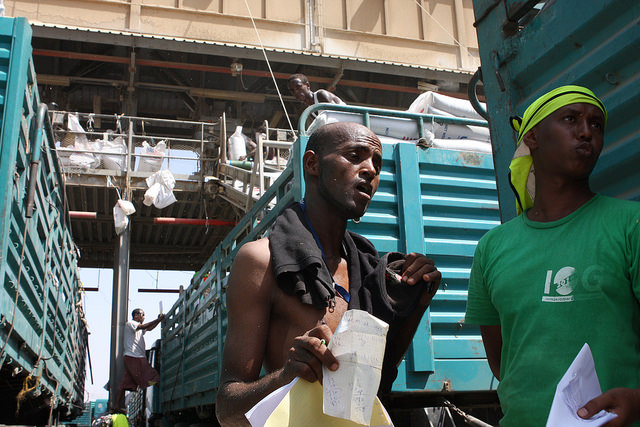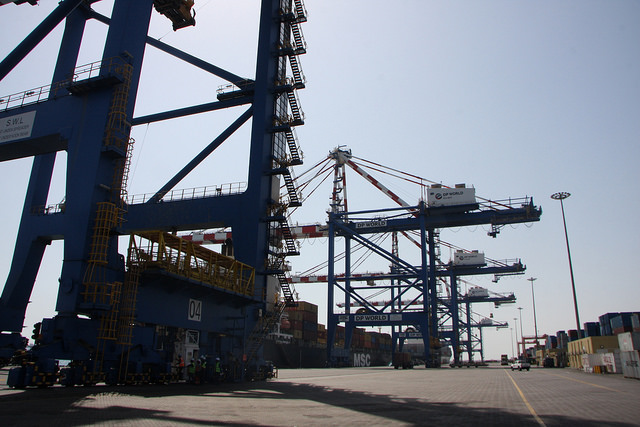The second part of our report on Yemeni refugees in Somaliland looks at how they have become part of the breakaway region’s struggle for international recognition, leaving them in awkward limbo.
STRANDED IN SOMALILAND – Part 1
Asthma Nibah can speak the language of the country where she has sought refuge. Growing up in Yemen, her stepmother was Somali, so as a young girl she learned the distinctive language from across the Red Sea.
Now a grandmother herself, she fled her native city of Aden last year after her granddaughter died of a curable disease amid the collapse of Yemen’s health system. Many hospitals in the Gulf country have been burned down, and those still standing can be dangerous, she says, as soldiers use them for cover.
At first sight, Somaliland, a non-country, not recognized by the international community as separate from Somalia and one of the poorest places on earth, is an unlikely place of refuge. But its history and culture, intertwined as they are with Yemen, was the obvious destination for Asthma and her surviving granddaughters, just as it has been for many other Yemenis.
It is not unusual for refugees to find themselves in poor countries. More than 80 percent of the world’s refugees are hosted in developing nations. But being a refugee in Somaliland is uniquely complicated.
Despite its ambitions to statehood, and the stability that Somaliland offers in sharp contrast to Somalia, the northern breakaway is no closer to winning international recognition. This statelessness affects all aspects of life and survival.
The majority of Yemeni refugees in Somaliland arrived in the ruined port of Berbera from which they must make their own way to the capital, Hargeisa. Awaiting them is the immigration department and Mohamed Ali Yusef, its general director.
There are no databases, no computers, everything is done manually, he explains. “We barely have capacity for ourselves,” says Hassan Omar, a Somali-Canadian who works as a consultant for the immigration department.

No one here disputes the carnage that Yemenis like Asthma are fleeing. “Total destruction is taking place in Yemen,” says Yusef. “Civilians are facing sophisticated weapons and they cannot resist.”
Nonetheless, the refugees have found themselves drawn into Somaliland’s battle for recognition. Roughly half of the arrivals from Yemen have some form of Somali origin. Under its rules, the U.N. refugee agency does not recognize these people as refugees. To the UNHCR they are returnees.
This is bitterly contested by the Somaliland government. Not only does it mean that the arrivals get none of the U.N. benefits associated with refugee status, making them a costly burden on a penniless administration, it is another reminder of Somaliland’s lack of statehood.
The government in Hargeisa argues that those whose origins are in Somalia are foreign arrivals in Somaliland and should be treated as refugees, not returnees. While Somaliland presses its argument with the U.N., hoping for a symbolic victory, many of those who fled the war in Yemen wait amid uncertainty.

Nizar Foazi’s identification documents and Yemeni passport. He says many Yemenis and Somali-Yemenis have fled to Somaliland without their ID documents because they had to run away so quickly. (Ashley Hamer)
Nizar Foazi, the head of Yemeni Community, a local refugee support group, says these arguments must not distract from what is going on in Yemen itself. He fled in April last year after a rocket attack destroyed his home in the capital, Sana’a. There are now checkpoints and snipers everywhere, he says, and outside the city massacres have become routine: “You can’t say you are safe in any place [in Yemen].”
The conflict in Yemen started in March 2015, when Houthi rebel forces took over Sana’a and allied themselves with forces loyal to former president Ali Abdullah Saleh. Then President Abd-Rabbu Mansur Hadi moved to Aden, backed by military support from Saudi Arabia. What started as an insurgency quickly escalated into full conflict, with more than 2.5 million people displaced inside the country and no sign of an approaching peace.
Yemeni Community was originally set up as a business enterprise for Yemeni immigrants coming to Somaliland. It has since pivoted to become a support network for the refugees, and Foazi says some of the support comes from his own pocket. “This came all of a sudden and we didn’t want to refuse help,” he said.

One of the children in the family, Salim, saw his friend’s face blown off when he picked up a grenade in Yemen in 2015. Salim’s mother Daifa says her son hasn’t been the same since the incident. (Ashley Hamer)
Now Foazi lives in a rambling house with two bathrooms and a flat-screen TV in Hargeisa with 22 other family members. He managed to organize passage for his own family, as well as his brother’s and aunt’s families. His brother was employed as an engineer in Yemen.
There are international and local security concerns that the influx from Yemen may be used as a cover for members of terror groups to enter the Horn of Africa, where Somali extremists al-Shabaab are already active.
“We’re between Shabaab, ISIS and al-Qaida,” says Ali Yusef. “So we worry about who is coming, and if they are from a fundamentalist group.”
So far, it appears that most of the refugees and returnees are traumatized civilians – many families with young children like Salim, 13, who saw his friend’s face blown off when he picked up a grenade while the two were playing.

Young Yemeni refugees wait in the UNHCR compound in Hargeisa to receive donated “dignity kits” for women. The kits include sanitary products, clean underwear, toiletries, as well as information about their rights and what support they are entitled to as refugees in Somaliland. (Ashley Hamer)
Salim’s mother, Daifa, holds back tears as she explains that her son has not been the same since the incident. Even though the mother and son are Yemeni, the overwhelmed authorities in Somaliland have yet to give them refugee status. Meanwhile, Daifa has a chronic blood pressure problem that she cannot afford to treat.
There can be little doubt though that she and her family are refugees. Daifa wants peace and the chance to take her family home: “If things are settled, I can return tomorrow.”
News Deep




























